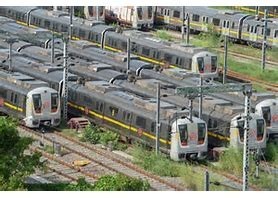Transport experts have backed the resumption of Metro services in Delhi for economic revival even as the medical fraternity appears divided over the issue amid rising Covid-19 cases in the national capital. Delhi reported the highest number of cases in 40 days —1,544— on Tuesday.
The Metro services were shut on March 22 as part of sweeping measures to enforce social distancing to check the pandemic spread.
The Centre is likely to allow the resumption of Metro services in September when the fourth phase of a plan to restart businesses and other activities restricted in view of the Covid-19 kicks in. The Metro is the transport lifeline of Delhi and the National Capital Region with nearly six million passengers daily. Most of the commercial activities have been allowed to resume in the city and residents say they face a lot of problems while commuting because of inadequate public transport and the restrictions on the number of passengers allowed to travel.
However, the delay in re-starting Metro services, transport experts say, will only result in increase in the use of private transport which is not good for a city, especially the capital. It will also defeat efforts being made to make people switch from private to public transport.
Amit Bhatt, director transport, WRI India, said, “In Unlock phase, it is imperative to restart public transport services because not everyone can afford personal transport nor there is enough space in our cities to accommodate endless private transportation. Cities like London have been operating limited services for a long time. There is no empirical study which shows mass transit has aided in the spread of the pandemic. Therefore, we need to restart these services with precaution, off course. Personal commuter hygiene like face masks, increased service frequency and digital payment will significantly improve the safety of these services.”
Centre for Science and Environment executive director (research and advocacy) Anumita Roychowdhury, who is a transport expert, underlined the importance of resuming public transport, especially Metro services, for the economic revival. “A lot of cities such as Hong Kong, London have Metro systems operational. In Hong Kong Metro operations were never stopped. They have adopted a lot of precautionary measures to ensure social distancing. This can be done here too.”
Some medical experts say the Metro services should start as offices, markets, hotels restaurants have opened. Others insist the resumption of the services will result in a faster spread of the infection.
Epidemiologists warn against the resumption citing an increase in Delhi’s positivity rate and the recent serological survey that found 29% of 15,000 people surveyed in the capital had antibodies for the Sars-Cov-2 that causes Covid-19.
“As per the second serological survey report, nearly 2/3 of the population is still unexposed. The positivity rate is already on a rise and if you create opportunities for people to mingle, then it will increase the chances of transmission of the infection,” said Dr Lalit Kant, a former head of epidemiology and communicable diseases department at Indian Council of Medical Research.
As the Metro connects Delhi with Gurugram, Noida, Ghaziabad and Faridabad, experts say that this will result in crowding at stations. “How will social distancing be ensured at stations? Currently, a lot of people from neighbouring areas are not able to come to Delhi as the Metro operations are closed. Starting it would only allow more movement of people and increase the chances of infection,” said Dr PK Sharma, an epidemiologist and former medical health officer, New Delhi Municipal Council.
Community medicine expert Dr Jugal Kishore of the Safdarjung Hospital said it is about time the government starts Metro services, as people are facing a lot of inconveniences while commuting. “People are using their own vehicles which are causing air and sound pollution. People who use Metro should follow all the precautions such as the use of face masks, social distancing etc.”
The Delhi Metro Rail Corporation (DMRC) has said it has taken measures to ensure social distancing at its stations and trains. It has finalised protocols, which will be modified as per the Centre’s guidelines to ensure contactless and cashless travel.
A DMRC official said there would be completely cashless transactions at ticketing counters, earmarked spots for passengers to stand while waiting for trains or at ticketing counters. The use of face masks and Aarogya Setu contact tracing mobile application, separate entry and exit point to the station premises, are some of the other measures the agency is likely to include to its protocols, the official added.
Roychowdhury said there is a need to build confidence among people. “We have anyway started the bus and other public transport services and people are using them. We need to build confidence among people that this mode of travel will be safe by ensuring stringent implementation of precautionary measures.”
BY HINDUSTAN TIMES







Comments (0)